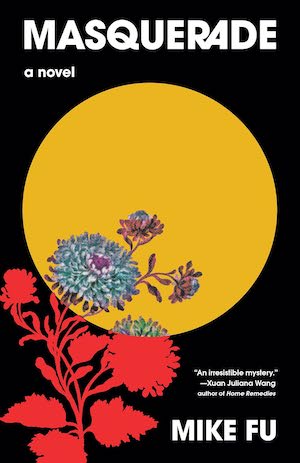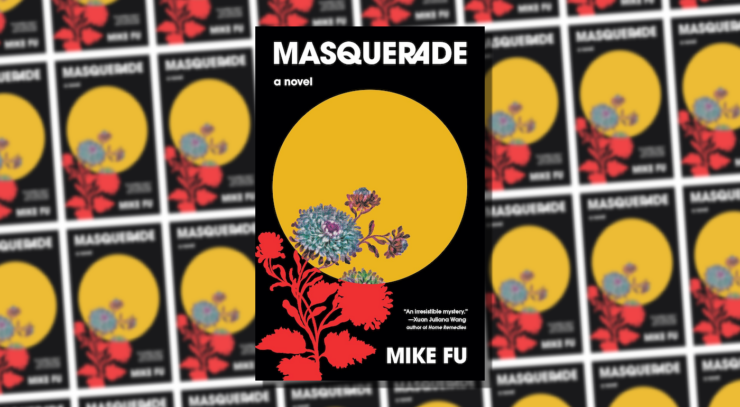There’s a fine line writers walk when creating a book in which a character finds themselves drawn to another book—one that might have uncanny properties. Michael Ende’s The Neverending Story, Italo Calvino’s If on a winter’s night a traveler, and Jordy Rosenberg’s Confessions of the Fox are all memorable reads that use this as both plot point and structural device. While each of these three disparate novels represents a path one can take, they’re far from the only template available to writers—and Mike Fu’s Masquerade is a memorable addition to this canon that does some very compelling things to the form.
For starters, there’s the way that Fu makes the dislocation between the real world and a fictional one only one of several ways protagonist Meadow Liu experiences a kind of dislocation. In the early pages of the novel, Fu situates Meadow as a character frequently in transit. We learn that he spent his childhood in both the United States and China—specifically, Shanghai. He returns there to visit his family, though he also meets up with his artist friend Selma, who has a residency there. Meadow is also house-sitting for Selma during this period; he works as a bartender and, we eventually learn, was in an intense relationship with a man named Diego, which ended abruptly when Diego vanished.
At the heart of Masquerade is a novel called The Masquerade, which Meadow finds in Selma’s apartment. The author is named Liu Tian; the translator is named Barnaby Salem. And when it comes to the former name, Meadow immediately picks up on what seems to be a coincidence.
What a weird coincidence, he thinks, that the writer has the same name as him—or he presumes so based on its romanization. There’s a chance that the surname Liu is a different character than his own, while tian too could be written any number of ways. Nonetheless, he likes the strange serendipity of it, imagining that he and the book’s author might share this common name by which countless Chinese men, and some women, have been known over the centuries.
Interestingly, Meadow seems so attuned to this that he misses something else that readers might have noticed: The surname of the novel’s translator is an anagram for “Selma.” This might be a coincidence or it might not; one of the running themes of Masquerade is the difficulty of seeking out hidden patterns in both art and life.
Buy the Book


Masquerade
As for the novel within the novel, it’s set in Shanghai on the eve of WWII. That book’s protagonist, Mizuno, is a Japanese writer and editor in Shanghai for work. At a masked party, Mizuno is drawn into an elaborate game involving ambiguous identities and an escalating amount of danger. It isn’t hard to see why Meadow is intrigued by this story; if Fu ever decided to write an entire version of The Masquerade, I’d happily read it. But the novel’s true origins become more of a mystery as Meadow begins to experience a series of uncanny events that relate to it.
First, there’s the matter of the book seemingly following him on his international travel, even if he doesn’t remember packing it. Once he’s begun reading The Masquerade, Meadow also observes some odd behavior from inanimate objects, including a mirror that behaves in ways no mirror should. And there’s a scene in which Meadow encounters a mysterious customer at his workplace who seems to have emerged fully-formed from the novel he’s reading.
Where Masquerade excels is in the way it evokes a lived-in version of New York—Brooklyn in particular—even as it also takes its protagonist to increasingly surreal places, both literally and metaphorically. In that quality, it’s similar to Laird Hunt’s The Exquisite, which also features a winding narrative that blends tactile details with an air of the fantastic. (Full disclosure: The Exquisite may well be my favorite New York City novel.) There are moments in which Fu describes Greenpoint—a neighborhood I’ve called home for more than half my life—in details that feel especially true to life. That contrasts nicely with the headier aspects of Meadow’s travels, some of which may stem from contact with The Masquerade, and some of which emerge out of mind-altering substances, sleep deprivation, or stress. That’s the challenge with ecstatic states of mind: They can be summoned sometimes, and sometimes they descend upon you.
In these liminal hours as night transitions into day, Meadow is often so stoned that the border between his life and that of the book seems to start to dissolve, or become permeable. He scours the text for a hint or clue, but remains empty-handed.
Where is Fu going with all of this? Doubles, altered identities, and elaborate plots all figure into the denouement of Masquerade—which makes sense, given that this is a novel called Masquerade. At the end of the first part of this novel, a mysterious man gives Meadow some advice: “Pay attention to symbols. In them you will find the answers to all you seek.”
That’s also a useful key to reading the novel in which Meadow is a character. There’s an element of mystery-box storytelling at work here, but there isn’t necessarily a scene at the end where a sober, buttoned-down authority figure pulls back the curtain and reveals the true shape of things. Without revealing too much about what’s happening here, there are more creative works to be found within this novel than just Selma’s art and The Masquerade. And you yourself might feel like your life is becoming as entangled with Meadow’s story as Meadow’s life is entangled with Mizuno’s. The way that Fu establishes the dreamlike mood of this novel goes a long way—but what a mood it is.










